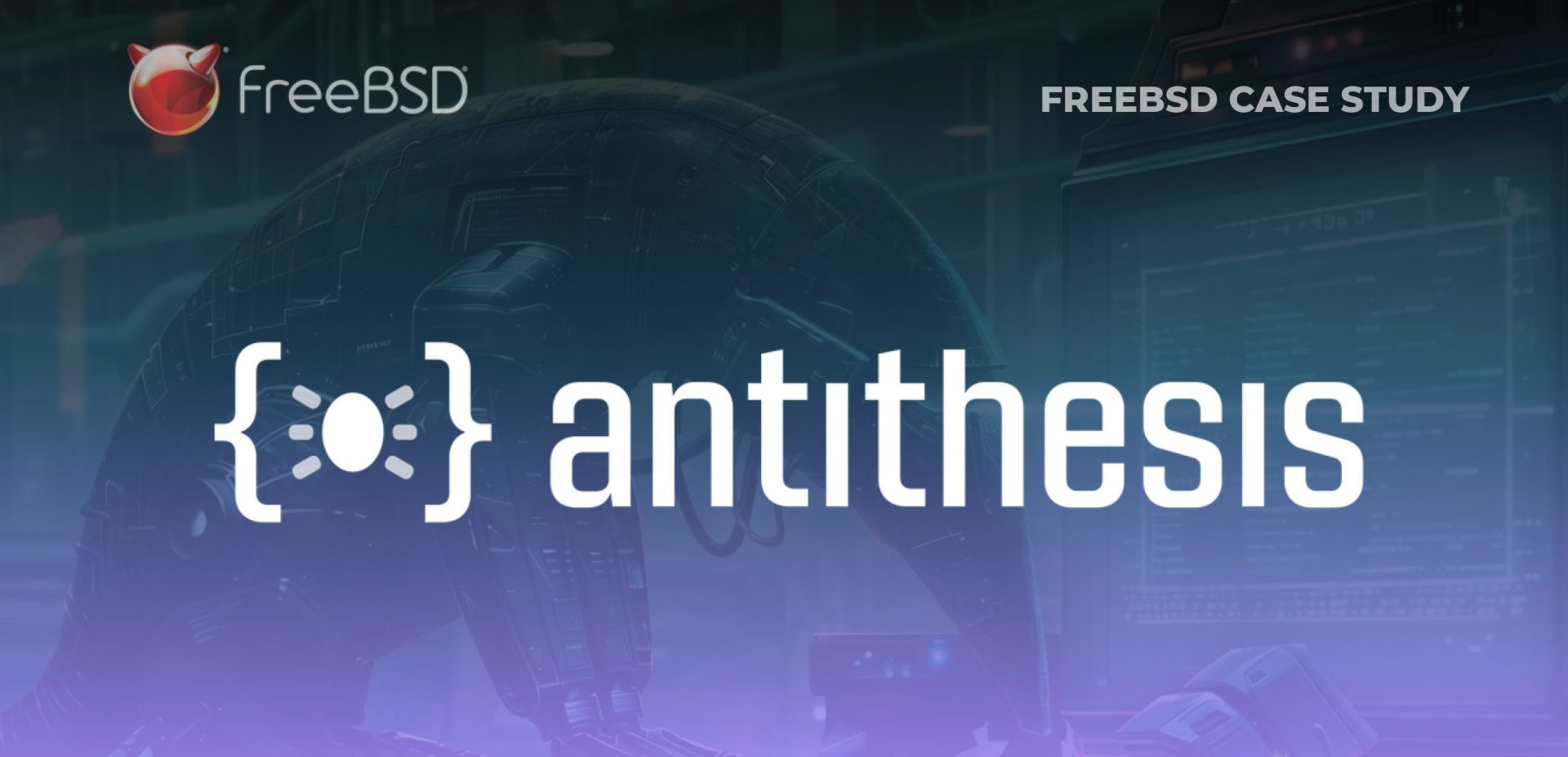- End User Story
- Antithesis
Antithesis: Pioneering Deterministic Hypervisors with FreeBSD and Bhyve

- Licensing
- Networking
- Performance
- Software Tools and Development
- Stability
- Virtualization
Antithesis is at the forefront of conquering one of the toughest parts of software engineering: transforming software testing and debugging to make it more efficient and reliable. Their solution is based on a deterministic hypervisor built on FreeBSD and its native hypervisor, Bhyve. Let’s explore the specific challenge Antithesis addresses, the reasoning behind selecting FreeBSD and Bhyve, and the promising potential of this groundbreaking technology.
Reproducing bugs consistently poses a significant challenge in software development, leading to prolonged debugging and increased costs. Traditional debugging tools have storage, OS dependency, and scalability limitations, especially for distributed systems.
Antithesis developed a deterministic hypervisor, “the Determinator,” using FreeBSD and Bhyve. It ensures consistent state and behavior through deterministic reproducibility, state-space exploration, and time-travel debugging.
Antithesis’s deterministic hypervisor improves software debugging efficiency and reliability, reducing development cycles and costs. Future plans include contributing to the FreeBSD open-source community, API testing, UI testing, financial transaction system testing, computer game testing, broader platform support, and integrating with CI/CD pipelines.
The challenge
In software engineering, bug reproducibility presents a significant challenge. Many bugs are elusive, appearing inconsistently under specific conditions that are hard to replicate. This inconsistency hinders debugging efforts, leading to prolonged development cycles and increased costs. Traditional debugging tools, such as record-replay mechanisms (dtrace, etc.), face storage requirements, OS dependency, and scalability limitations, especially in distributed systems.
Antithesis identified the need for a robust solution to provide consistent and reproducible testing environments, enabling developers to explore, diagnose, and fix bugs thoroughly. This need gave birth to their deterministic hypervisor project.

Antithesis’s choice of FreeBSD: Antithesis required a stable, flexible, and permissively licensed operating system to develop its deterministic hypervisor. With its clear architectural design and comprehensive feature set, FreeBSD perfectly met these needs, providing the essential support for Antithesis to innovate and customize its hypervisor effectively.
FreeBSD’s permissive licensing model was favorable for Antithesis, allowing them to build proprietary solutions without the constraints of more restrictive licenses.
A permissive license is a type of software license that grants recipients extensive rights to modify, use, and distribute software, often with minimal restrictions. These licenses typically allow the software to be used in proprietary or closed-source projects without requiring those projects to release their source code. Permissive Licenses contrast with copyleft licenses, which impose more stringent requirements on how the software can be distributed and modified.
Technological Merits: FreeBSD is renowned for its clean and well-architected codebase. This simplicity and clarity made it an ideal foundation for the deterministic hypervisor, as it required extensive modifications and enhancements.
Maturity and Simplicity: Bhyve, the native hypervisor of FreeBSD, offered a mature and relatively simple codebase compared to other hypervisors like Xen and KVM. Its well-factored and clean architecture provided a solid starting point for the extensive changes required by Antithesis.
Customization: Antithesis needed to strip down and modify Bhyve significantly to achieve determinism. By focusing on core deterministic behavior and incrementally building out functionality, they created a hypervisor that ensures consistent state and behavior across multiple runs.
Implementation of the Determinator on FreeBSD and Bhyve
Antithesis developed a deterministic hypervisor, “the Determinator,” to provide a controlled and reproducible testing environment. The Determinator runs a collection of containers within a single virtual machine managed by the hypervisor. This setup ensures that the entire system state is consistent and reproducible, allowing for thorough bug exploration and debugging. The Determinator’s capabilities include:
Deterministic Reproducibility: Ensuring that every run of a software test yields the same results, down to the exact sequence of states within the virtual machine.
State-space Exploration: Enabling comprehensive exploration of different execution paths to identify potential bugs and issues.
Time-travel Debugging: Allowing developers to step back and forth through execution history to pinpoint the exact moment and cause of bugs.
Snapshotting Capability: One of the key features implemented was advanced snapshotting, allowing the entire state of the virtual machine to be saved and restored instantaneously. This capability is crucial for creating reproducible test environments and enabling detailed analysis of software behavior.
Scalability: Despite running on a single core, the deterministic hypervisor supports extensive parallelism by running multiple VMs, each exploring different parts of the program state.
Future directions
Antithesis plans to continue enhancing their deterministic hypervisor and expanding its capabilities. Their plans include:
Open Sourcing and Community Involvement: While the current focus is on product development, Antithesis is interested in open-sourcing parts of their work to contribute back to the community and foster collaboration.
New Testing Scenarios: Antithesis will add future scenarios for API testing, UI testing, financial transaction system testing, and computer game testing.
Broader Platform Support: Extending support to more operating systems and hardware configurations to make the hypervisor more versatile and widely applicable.
Integration with CI/CD Pipelines: Incorporating the deterministic hypervisor into continuous integration and delivery pipelines to automate testing and ensure high-quality releases.
Conclusion
Antithesis innovatively uses FreeBSD and Bhyve to create a deterministic hypervisor, a tool that addresses a crucial issue in software development: the reproducibility of bugs. By ensuring a consistent and controlled testing environment, it significantly enhances the efficiency and reliability of software debugging and testing. Through its continuous commitment to innovation and community engagement, Antithesis is well-positioned to make significant contributions to the field of software engineering.
Getting started with FreeBSD
If your organization is considering implementing FreeBSD in a solution, consulting The FreeBSD Foundation can be helpful. The FreeBSD Foundation assists with technical and implementation questions and helps with networking and connecting community members. For organizations interested in starting with FreeBSD, you can contact The FreeBSD Foundation via the “Contact Us” page on their website or download FreeBSD to get started today.
